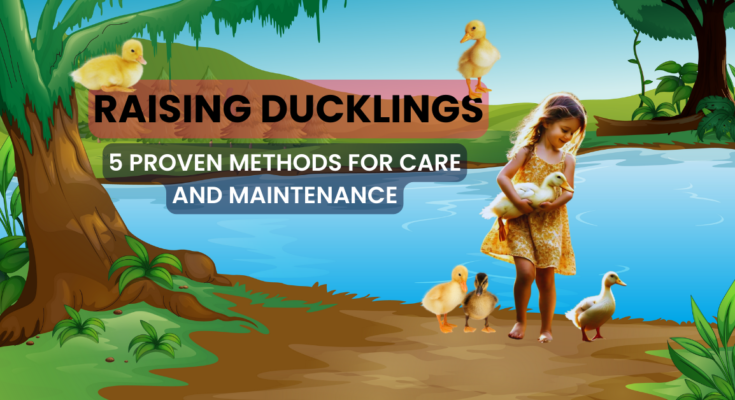Introduction
Are you considering adding a unique and delightful addition to your farm or backyard? Look no further than ducklings! These adorable waterfowl have captivated the hearts of many with their charming personalities and practical benefits. Whether you’re interested in raising ducklings as pets or for their eggs and pest control abilities, this guide will provide you with essential information to ensure their health and happiness.

Breeds and Characteristics of Ducklings
| Breed | Size | Plumage | Purpose | Temperament | Characteristics |
| Pekin Ducks | Large | White | Meat production, pet | Friendly, easy to handle | Known for fast growth rate and large size. Popular choice for meat production and as pets. |
| Mallard Ducks | Medium | Colorful (green head, brown body, yellow bill) | Egg production, pet, wild habitat | Adaptable, social | Most common wild duck species. Can be raised domestically. Known for colorful plumage and adaptability. |
| Runner Ducks | Medium | Various colors (black, white, brown, gray) | Pest control, egg production, pet | Active, comical | Slender and upright with distinctive running gait. Excellent foragers, popular for pest control in gardens. |
| Khaki Campbell | Medium | Brown | High egg production | Docile, good foragers | Known for exceptionally high egg production rates. Brown plumage. |
| Indian Runner | Medium | Various colors | Egg production, pet | Active, alert | Similar to Runner ducks but with a more upright posture. |
| Wood Duck | Medium | Colorful | Wild habitat, pet | Shy, prefers wooded areas | Colorful plumage, suitable for wild habitat or as pets in large enclosures. |
Considerations When Choosing a Breed:

- Space and Housing Requirements: Some breeds may require more space due to their size or activity level.
- Egg Production Needs: Choose breeds like Khaki Campbell for high egg production.
- Meat Production Needs: Pekin ducks are ideal for meat production due to their size.
- Pest Control Needs: Runner ducks are excellent for controlling pests in gardens.
- Temperament and Handling Requirements: Consider the temperament and handling ease, especially if raising as pets.
- Color and Size Preferences: Personal preference for plumage color and duck size may influence your choice.
Understanding these characteristics and considerations will help you choose the best duckling breed to suit your specific needs and preferences.
Care and Maintenance Tips for ducklings

Proper care is crucial for the health and well-being of your ducklings. Here are essential tips to ensure they thrive:
Enclosure:
- Provide a spacious and secure enclosure or brooder with ample room for ducklings to move around.
- Use bedding such as straw or pine shavings that is clean, dry, and non-toxic.
Diet:
- Feed ducklings a high-quality duck starter feed that is specifically formulated for their nutritional needs.
- Offer small amounts of greens and vegetables as they grow older to supplement their diet.
Water:
- Ducklings need access to clean, shallow water for drinking and grooming from day one.
- Use a shallow dish or waterer to prevent drowning, as ducklings can easily get soaked and chilled.
Heat and Lighting:
- Provide a heat lamp or brooder to maintain a temperature of around 85-90°F for the first week, gradually reducing it by 5°F per week until they are fully feathered.
Essential Supplies for Ducklings
To ensure the comfort and well-being of your ducklings, gather the following supplies before bringing them home:
- Brooder or Enclosure: A secure and draft-free space large enough to accommodate growing ducklings.
- Heat Lamp: Essential for regulating temperature and keeping ducklings warm.
- Feeder and Waterer: Sturdy and easy-to-clean containers for food and water.
- Bedding: Soft bedding material such as straw or wood shavings for warmth and cleanliness.
- Swimming Area (optional): Provide a shallow pool or tub for older ducklings to splash and swim.
Health Checks and Veterinary Care

As a responsible duck parent, monitoring your ducklings’ health closely is essential to catch any potential issues early on. Recognizing signs of good health and being aware of common health issues will help you provide optimal care.
| Signs of Health | Details |
| Active Behavior | Ducklings should be energetic and curious, exploring their surroundings with enthusiasm. |
| Bright Eyes | Eyes should be clear, bright, and free of discharge. |
| Clean Feathers | Feathers should be shiny, clean, and well-maintained. |
| Common Health Issues | Details |
| Lethargy | Ducklings may appear weak, tired, or unresponsive. |
| Diarrhea | Abnormal droppings may indicate digestive issues. |
| Abnormal Feather Growth | Feathers may be brittle, broken, or growing irregularly. |
| Labored Breathing | Rapid or difficult breathing may indicate respiratory problems. |
| Wounds or Injuries | Open wounds or injuries may lead to infection. |
| Veterinary Care | Details |
| Find an Avian-Savvy Veterinarian | Not all veterinarians are experienced in bird care. Find one with expertise in avian health. |
| Regular Check-Ups | Schedule regular health checks to monitor your ducklings’ well-being and detect issues early. |
| Immediate Treatment | Seek veterinary attention promptly if you suspect any health concerns. |
| Additional Tips | Details |
| Keep a First-Aid Kit on Hand | Have supplies ready to treat minor injuries or illnesses. |
| Maintain a Clean Environment | Ensure living spaces are clean and well-ventilated to prevent health issues. |
| Stay Informed | Continuously educate yourself on duck health and care practices. |
Health Checks:
- Monitor your ducklings daily for signs of illness or distress.
- Check for changes in appetite, water consumption, stool or urine output, lethargy, breathing, feather condition, wounds, and eye/nose discharge.
- Keep a record of observations to track changes and potential health issues.
Common Health Issues:
- Respiratory problems (e.g., pneumonia, bronchitis)
- Digestive issues (e.g., diarrhea, constipation)
- Parasites (e.g., mites, lice, worms)
- Bacterial infections (e.g., E. coli, Salmonella)
- Viral infections (e.g., duck plague, avian influenza)
- Injuries or trauma (e.g., broken wings, head injuries)
- Nutritional deficiencies
Veterinary Care:
- Find a veterinarian experienced in avian care.
- Schedule regular check-ups (e.g., every 6-8 weeks).
- Follow vet recommendations for vaccinations, parasite control, nutritional supplements, and health testing.
- Seek immediate vet attention for any health concerns.
First-Aid Kit:
- Include gauze, antiseptic wipes, bandages, scissors, tweezers, thermometer, antibiotic ointment, and electrolyte solution.
Remember, prioritizing your ducklings’ health with proactive care and prompt veterinary attention ensures they lead long, healthy lives. Stay vigilant and consult a vet for professional advice and assistance as needed.
Lifespan Factors
- When it comes to the lifespan of ducklings and adult ducks, several factors play a crucial role. By understanding these influences, you can provide the best care possible and help maximize their lifespan:
| Factor | Details |
| Genetics | Duck breeds vary in their natural hardiness and longevity. Some breeds are known to live longer than others. Understanding your duck’s genetic background can give insight into its potential lifespan. |
| Genetic factors also influence how well ducks resist diseases, grow, and maintain overall health, all of which impact their lifespan. | |
| Diet and Nutrition | Diet: Providing a balanced and age-appropriate diet is essential. Ducklings require starter diets with higher protein levels, while adult ducks need maintenance diets with lower protein but essential nutrients like vitamins and minerals. |
| A proper diet supports growth, feather development, egg production (for female ducks), and overall health throughout their lives. | |
| Nutritional Supplements: Adding supplements like calcium for eggshell production in laying ducks or probiotics for digestive health can also enhance longevity. | |
| Environmental Conditions | Living Conditions: Ducks need clean water for drinking and bathing, proper shelter to protect them from extreme weather, and good ventilation to prevent respiratory issues. |
| Stressors like overcrowding or inadequate space can lead to aggression, poor health, and reduced lifespan. | |
| Hygiene and Cleanliness: Regularly cleaning their living area prevents the buildup of harmful bacteria and reduces the risk of diseases that can shorten their lifespan. | |
| Health Management | Regular Health Checks: Monitoring ducks for signs of illness, injury, or abnormal behavior allows for early intervention and treatment, preventing conditions from worsening. |
| Veterinary Care: Establishing a relationship with a qualified avian veterinarian ensures proper vaccinations, deworming, and prompt treatment of illnesses, which can significantly extend their lifespan. | |
| Predation and Accidents | Ducks are vulnerable to predators such as foxes, raccoons, and birds of prey. Implementing predator-proof fencing, secure enclosures, and nighttime housing protects them from harm. |
| Removing potential hazards from their environment, such as sharp objects or toxic plants, reduces the risk of accidents that could shorten their lifespan. | |
| Social and Behavioral Factors | Socialization: Ducks are social animals that thrive in groups. Providing companionship and interaction with other ducks or suitable species reduces stress and promotes mental well-being. |
| Behavioral Enrichment: Offering opportunities for natural behaviors like foraging, swimming, and nesting stimulates their minds and bodies, enhancing their overall quality of life and lifespan. | |
| Climate and Temperature | Ducks are sensitive to temperature extremes. Maintaining a comfortable temperature range in their environment (typically between 50-75°F) prevents stress-related illnesses and supports their health and longevity. |
| Providing shade and shelter during hot weather and insulated housing during cold weather protects them from temperature-related health issues. |
Understanding these factors and taking proactive steps to address them will help ensure your ducklings and adult ducks lead long, healthy lives. Providing a nurturing environment, proper care, and attention tailored to their needs will help them thrive and reach their full potential.
Why Diaper Ducklings?
Ducklings, much like human babies, require frequent diaper changes to maintain cleanliness and comfort. Diapers play a crucial role in:
- Managing Messes: Ducklings are prone to digestive issues, and diapers help contain messes, making cleanup easier.
- Hygiene: They keep bedding clean, which is essential for maintaining a hygienic environment.
- Health: Diapers keep ducklings dry and prevent skin irritation, promoting healthy development.
Choosing the Right Diaper
When selecting diapers for your ducklings, consider the following:
| Aspect | Consideration |
| Specific Design | Opt for diapers designed for small birds or specifically for ducklings. |
| Material | Choose diapers with a waterproof lining and absorbent material. |
| Breathability | Ensure the diaper allows for airflow to prevent moisture buildup and discomfort. |
Diaper Sizing
It’s crucial to choose the right size diaper for your ducklings:
| Aspect | Consideration |
| Fit | Select a diaper that fits snugly but comfortably, without being too tight. |
| Weight Consideration | Take into account the weight and size of your ducklings when choosing diaper sizes. |
Diaper Changing
Follow these tips for proper diaper changing:
| Aspect | Tip |
| Frequency | Change diapers every 2-3 hours to maintain cleanliness and prevent discomfort. |
| Cleaning | Use gentle, fragrance-free wipes or cloths to clean your ducklings during changes. |
| Skin Protection | Apply a thin layer of diaper cream or petroleum jelly to prevent skin irritation. |
Tips and Considerations
Here are additional tips to ensure effective diapering for your ducklings:
- Monitor Absorbency: Regularly check ducklings’ droppings to ensure the diaper is absorbing properly.
- Size Adjustment: Adjust diaper sizes as your ducklings grow to ensure a comfortable fit.
- Skin Health: Watch for signs of diaper rash or irritation, and adjust care as needed to maintain skin health.
By following these guidelines, you can provide your ducklings with the comfort and care they need to thrive. Prioritize their well-being to ensure a happy and healthy experience!
Costs Associated with Raising Ducklings
Understanding the financial commitment involved in raising ducklings helps you plan effectively:
- Initial Costs: Includes purchasing ducklings, setting up their enclosure, and acquiring necessary supplies.
- Ongoing Expenses: Budget for feed, bedding, veterinary care, and any unexpected costs that may arise.
Adoption Considerations
Are you ready to bring home some quacking cuteness? Before adopting ducklings, it’s essential to consider a few crucial factors to ensure a happy and healthy experience for both you and your feathered friends.
Space Requirements: Room to Roam and Splash
Ducklings need space to stretch their wings and legs! Provide a safe and secure area for them to roam, exercise, and play. A minimum of 2-3 square feet of space per duckling is recommended. Additionally, ducks love water, so ensure access to a pool or pond that’s at least 1-2 feet deep for swimming and splashing.
Time Commitment: Daily Care and Attention
Ducklings require daily care and attention to thrive. Be prepared to dedicate time for:
- Feeding: Provide a balanced diet, and refresh water frequently.
- Cleaning: Keep their living space clean, and change bedding material regularly.
- Monitoring Health: Keep an eye out for signs of illness or stress
Local Regulations: Know the Laws and Rules
Before bringing home your ducklings, check with your local government for:
- Permits: Are any special permits required to keep ducks?
- Zoning Laws: Are there restrictions on keeping ducks in your area?
- Health Regulations: Are there specific requirements for housing and caring for ducks?
By considering these factors, you’ll be well-prepared to provide a happy and healthy home for your ducklings. Remember, adopting ducks is a big responsibility, but with the right care and attention, it can be a wonderfully rewarding experience!
Conclusion
Raising ducklings can be a rewarding experience whether you’re a hobbyist or a farmer. By providing them with proper care, nutrition, and a safe environment, you can enjoy the companionship and benefits these charming waterfowl offer. Remember, each duckling has its own personality and needs, so tailor your care approach to ensure they thrive and grow into healthy adult ducks.




